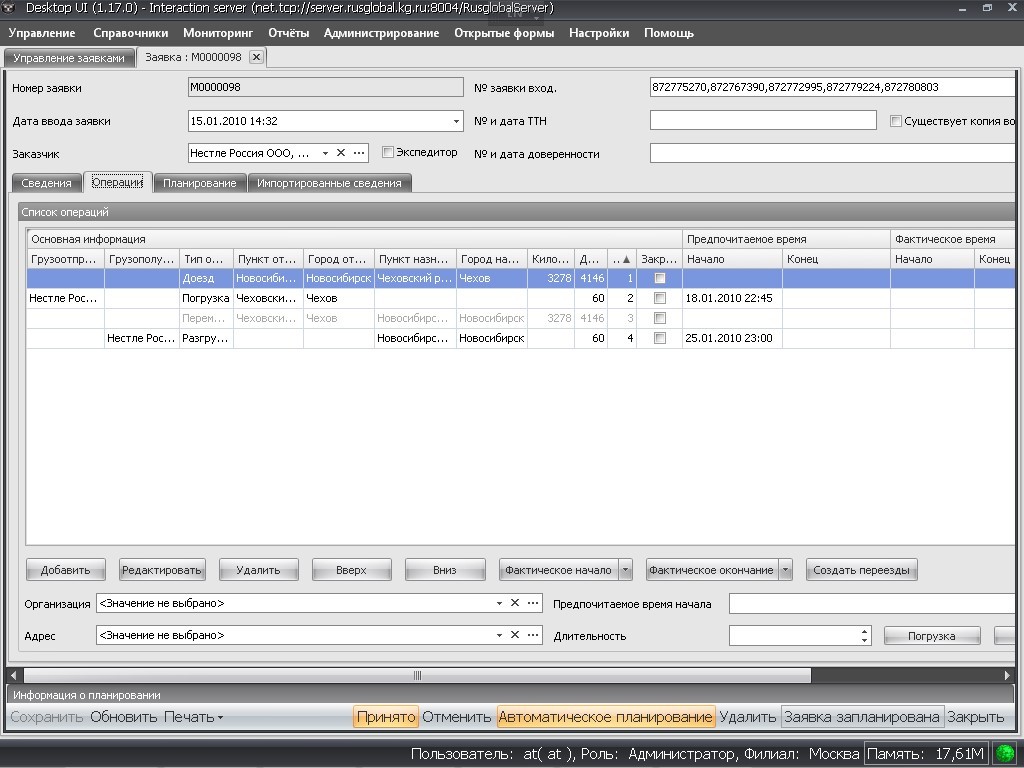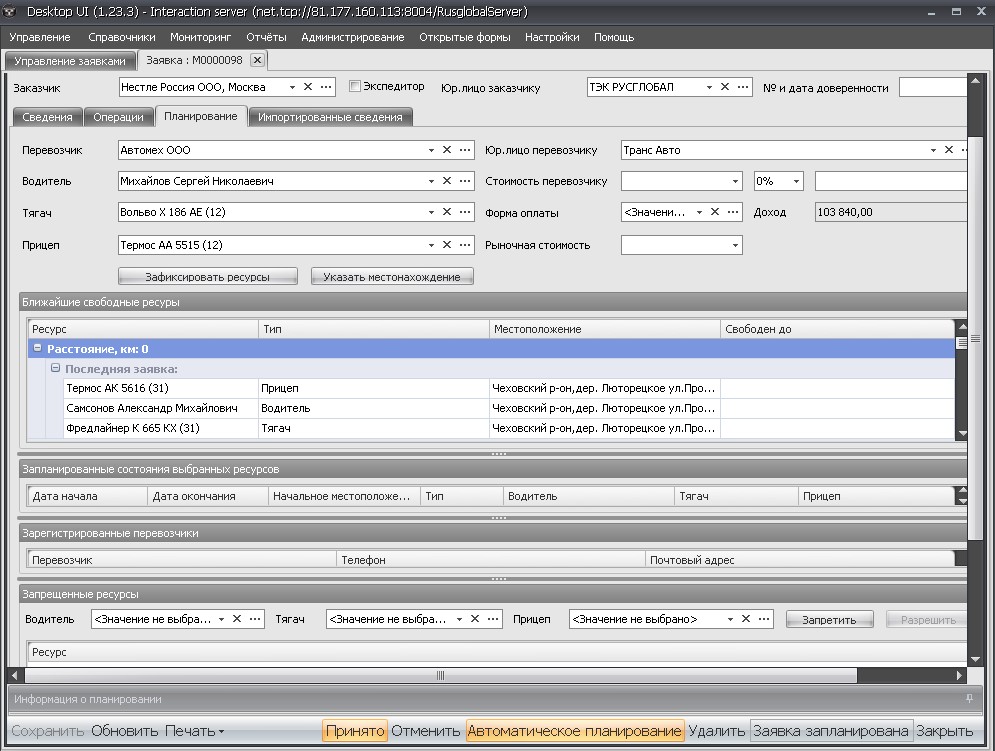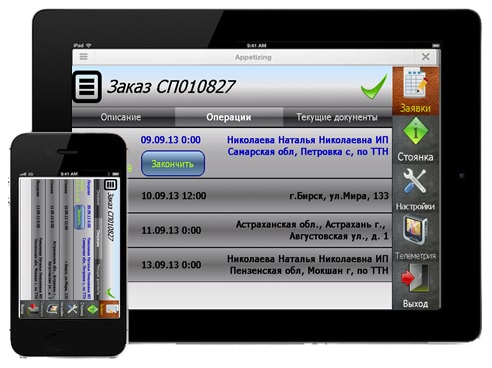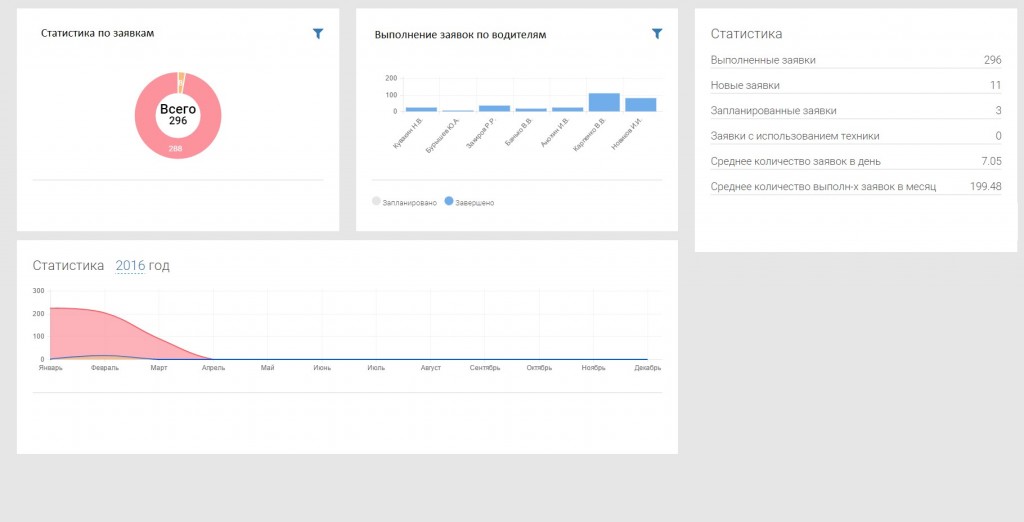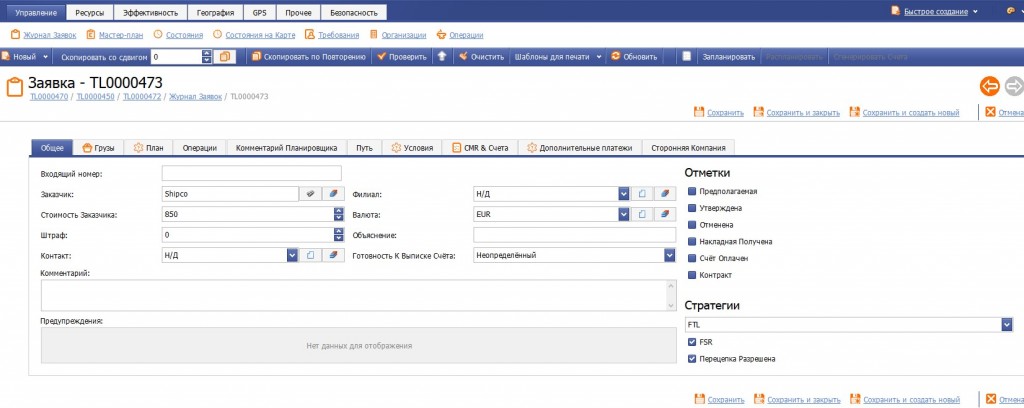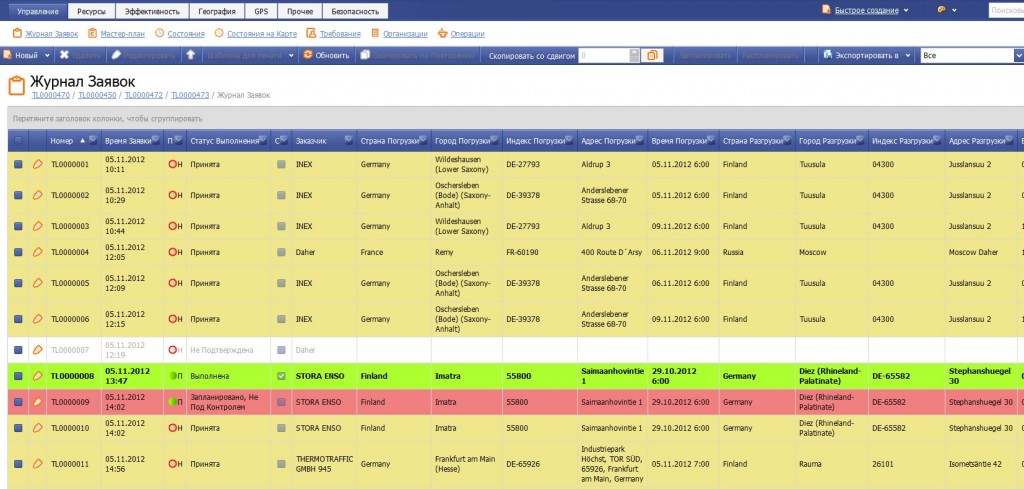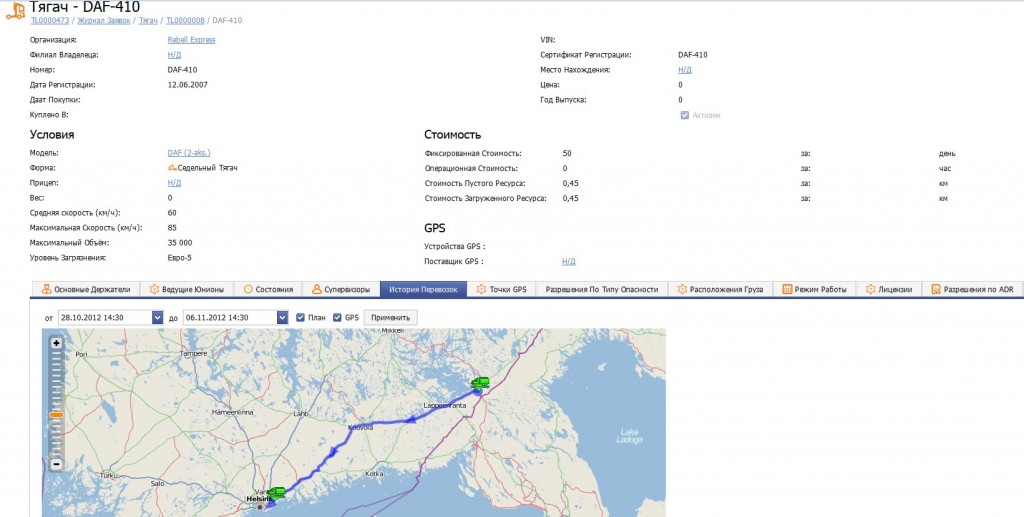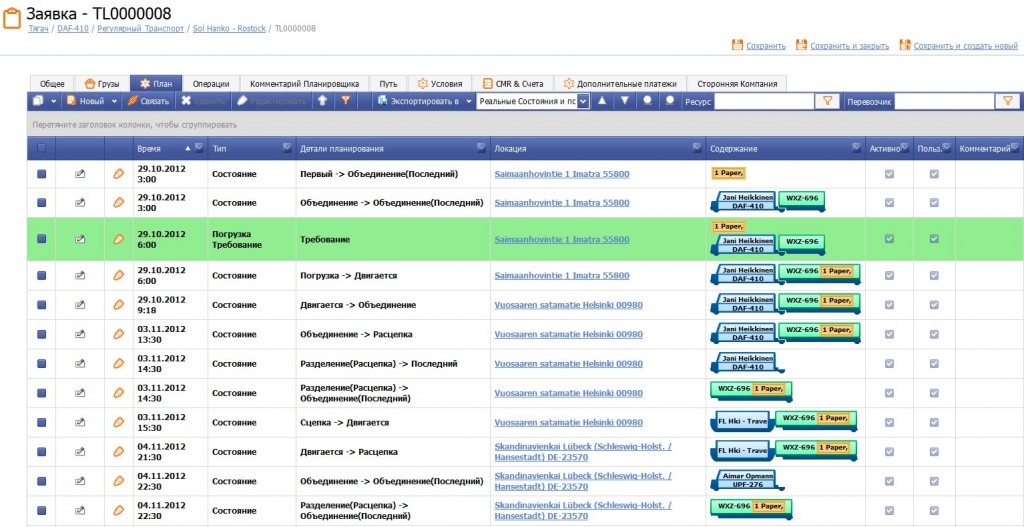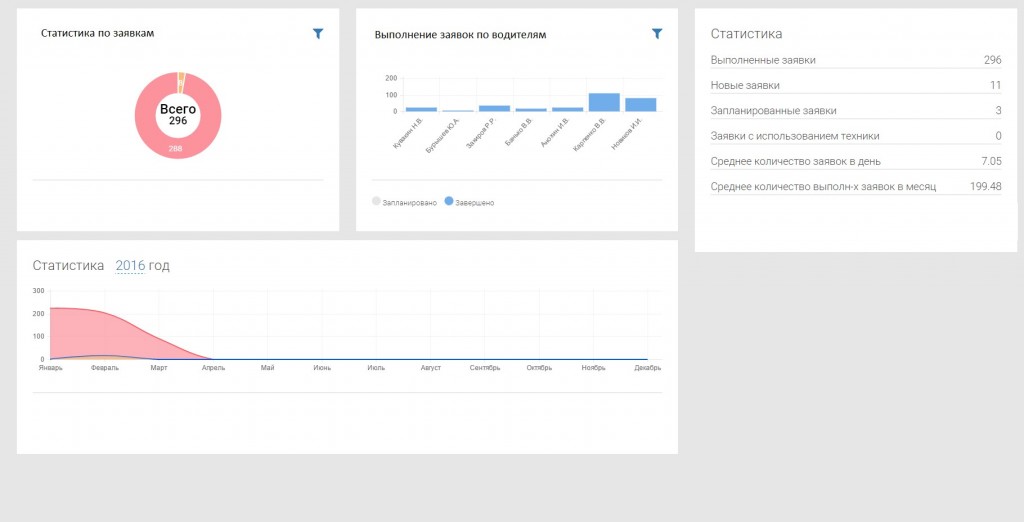Smart Trucks is a family of products for management of resources of transport and logistics companies:
Smart FTL Logistics is designed for transport and logistics companies with their own fleet of trucks managing long-distance transportation using the FTL model.
Smart LTL Logistics is designed to manage long-distance, intra-city and regional transport using the LTL model (Less Than Truckload) and supports management of multimodal cargo transportation.
System Demo Video (in Russian)
Our publications on Smart Trucks (in English)
Our publications on Smart Trucks (in Russian)
Smart system for managing full truckload transportation
Purpose
Smart FTL Logistics is designed for transport and logistics companies with their own fleet of trucks managing long-distance transportation using the FTL model.
The system allows managers, logistics specialists and dispatchers to automatically schedule incoming applications, track location and routes of all trucks, monitor progress of applications, interact with drivers online via tablets, and calculate the current business performance indicators in real time.
Smart support of real-time traffic management decision-making helps improve work efficiency, provide a flexible individual approach to each order and resource, avoid shortage or idle run of resources, reduce idle mileage and other costs and risks.
Implementation Results
Using Smart FTL Logistics allows transport companies to:
- Reduce complexity of enterprise management — by up to 25-40%;
- Reduce operating costs and total mileage, and thus reduce the cost of fuel and lubricants by automating order planning and monitoring their execution at all stages — by up to 25%;
- Expand the scope of analytical tools for calculating the cost of cargo delivery by their own transport or by attracted vehicles;
- Increase the number of deliveries made by one truck — by up to 35%;
- Increase vehicle load — by up to 25%;
- Minimize idle runs — by 20-40%;
- Improve business processes of receiving and fulfilling orders with high quality, just in time, with minimal losses and risks;
- Reduce dependence on personalities and speed up the process of knowledge transfer — by up to 50%;
- Create a software platform for business growth without increasing the number of management staff — by up to 25%;
Application
The system expands intellectual capacity of existing accounting systems due to intellectualization of processes of resource allocation, optimization and control in real time.
The peculiarity of the system consists in adaptive multi-criteria planning of orders and resources in real time, including such criteria as due delivery time, minimization of mileage, profit, driver’s load, etc.
Adaptability of the system allows for achieving high level of responsiveness, flexibility and efficiency in decision making, and makes it possible to rebuild schedule in a sliding mode in real time, when new orders occur, and include a new order in the general plan without total rearrangement of the current schedule.
The result of system implementation is increase in business efficiency by 20-40% due to switch to real-time decision making, without increase in the number of managing staff or trucks.
Smart FTL Logistics allows for taking into account the following requirements while planning:
- Peculiarities of customers’ orders connected with different types of cargos (temperature conditions, compatibility, etc.);
- Differences of trucks and their equipment (capacity, lift device, trailer, etc.);
- Peculiarities of transportation network, accounting of secondary logistics transport schedule (points of loading and unloading, railway or ferry transportation, opening hours of stores and warehouses, etc.);
- Possibility of using warehouses of intermediate storage;
- Large number of routes for order delivery;
- Need for route replanning when new orders, traffic jams, road traffic accidents or repair works appear;
- Following business regulations of a company, which determine preferences and constraints as well as maximizing various criteria which influence efficiency;
- Requirement of cargo consolidation in order to provide full load of trucks;
- Requirement of assigning cargoes of different size and weight to suitable types of trucks with different types of trailers;
- Building individual route schedules for each truck taking into account visas for border crossing;
- Possibility to re-hook tractors and trailers in order to provide continuous moving.
Adjustment of criteria and their relevance allows for setting up the system for certain needs and strategic aims of a customer.
Since there are a number of alternative schedules for the same set of orders, the main objective of the system is to find the best one among them in the current situation, which would satisfy the given criteria.
Main Users:
Manager
- Forming a list of orders for allocation;
- Adaptive planning of cargo transportation considering peculiarities of orders and resources (taking into account a large number of criteria to be set);
- Electronic document flow;
- Automatic calculation of delivery cost by company’s or third-party trucks, taking into account all loading/unloading points.
Dispatcher / logistics specialist
- Changing plan in real time when new events occur;
- Support of interaction with drivers via terminals (fact of loading, unloading, stops, notifications about unforeseen events; relevant order list, routes and schedule, photos of documents or events on the route);
- Control of prompt order execution on the map.
Driver
- confirmation of possibility of order delivery;
- minimization of expenses for public road transportation;
- displaying plan and route in the course of order execution;
- input and transfer of information about facts of loading/unloading, stops, notification about unforeseen events.
Director
- increase in quality and decrease in labor intensity of resource management;
- monitoring key indices: current profit/loss, unprofitable transportation directions, etc.;
- possibility of forecasting problem situations and advanced solution of them;
- total control (transparency) of business at any point of time;
- ability to model business development.
Customer
- possibility of order input via web-portal;
- control of the state of order planning and delivery via system web-portal, which is available to a customer in any Internet access point;
- email or sms notification about the process of his transportation;
- automatic calculation of delivery cost when adding orders via system web-portal.
Functionality
Forming order list
Adaptive planning considering peculiarities of a company’s orders and resources as well as plan correction in real time when new events occur.
Support of interaction with the driver via phone / tablet:
Forming reports and analytics on performance of the logistics company:
Monitoring and control of order execution:
Advantages
-
- Adaptability. Smart FTL Logistics system provides adaptive panning of resources depending on events in real time. This is extremely important when the moment of decision making affects the quality of transportation service and company’s efficiency.
- Intelligence. Smart FTL Logistics system remembers all orders and resources and knows how to manage trucks, so it works as an assistant dispatcher, continuously considering changes in the situation and generating decision-making options. It decreases mental stress load of dispatchers, labor intensity of resource planning and control, stress under lack of time.
- Flexibility and Responsiveness. The system allows for quick reaction to unforeseen events in real time by flexible resource allocation, satisfying occurring demands of a customer without delays and solving new conflicts between orders and resources. Thus, rescheduling, when unforeseen events occur, takes from several seconds to two minutes, while making decision by a dispatcher takes about 4 hours. Moreover, the quality of the decision made by the system is as high as the experienced dispatcher’s one.
- Individual approach. Smart FTL Logistics takes into account peculiarities of business and individual features of the cargo: temperature conditions, compatibility with other types of cargos, etc.).
- Support of coordinated teamwork. Smart FTL Logistics supports coordinated work of specialists with its own and third-party fleet, including managers and logistics specialists, dispatchers and operators. However, it always allows dispatcher to take control and interactively modify or change system solutions if necessary.
- Integration. Smart FTL Logistics is easily integrated with accounting systems (1С) and systems of transport monitoring of GPS/GLONASS navigation.
- Availability to customers. Smart FTL Logistics solutions are available for purchasing according to the SaaS model (Software-as-a-Service). Thus, we try to make our systems available even for small and medium business.
Implementation Experience
Currently the system is being actively developed and already implemented in Russian company “Navo-Prom Ltd”. Besides, it is being tested in several Finnish transportation companies.
Implementation of the system brings tangible economic effect, in particular, for the company «Monopoly» the following measured results are noted:
- the number of executed orders increased by 4.5% (with the same amount of resources);
- total increase in the number of applications for transportation — by 2.7%;
- increase in utilization of its own fleet;
- the number of delays to the client reduced by 3.5%;
- the business becomes less dependent on the human factor;
- reduced complexity of calculations and number of errors.
According to Oleg Bystrov, the head of IT department of LORRI, implementation of Smart FTL Logistics allowed for the following effect:
- an increase of 5% in the total volume of executed orders (with the same amount of resources);
- each kilometer gives an additional 1-3 rubles;
- reduction in idle run of each truck by 3-5%;
- reduced truck downtime by 5–7%;
- reduction of penalties and fines by 2–4%.
Learn more about Smart FTL Logistics
Smart system for managing less-than-truckload transportation
Purpose
Smart LTL Logistics is aimed at managing intercity, intracity and regional cargo deliveries according to the LTL model (Less Than Truckload).
It can be applied for logistics distributing companies, online stores as well as other companies having their own logistics service.
The system enables directors, managers, logistics specialists and dispatchers to plan incoming orders automatically taking into account compatibility regulations of cargos and a number of other criteria (minimization of mileage, driver’s load, truck resource, maximal profit, etc.). Besides, it allows for tracking location and routes of all trucks, controlling the process of order execution, interacting with drivers online via tablets/terminals as well as calculating current KPIs in real time.
Smart decision-making support for managing less than truckload transportation in real time makes it possible to increase company’s efficiency, to provide flexible individual approach to each order and resource, to avoid lack of resources or idle resources, to reduce idle mileage and to decrease other expenses and risks.
Implementation Results
Using Smart LTL Logistics will enable transportation companies to:
- decrease operation expenses and total mileage and, consequently, to decrease fuel expenses (by 25%) due to automation of planning and control of execution at all stages;
- have automatic tools for calculation of delivery cost by their own truck or a third-party one;
- increase the number of deliveries made by one truck (by 35%);
- increase load of trucks (by 25%);
- minimize idle mileage;
- optimize business processes.
Application
The system expands intellectual capacity of existing accounting systems due to intellectualization of processes of resource allocation, optimization and control in real time.
The peculiarity of the system consists in adaptive multi-criteria planning of orders and resources in real time, including such criteria as due delivery time, minimization of mileage, profit, driver’s load, etc.
Adaptability of the system allows for achieving high level of responsiveness, flexibility and efficiency in decision making, and makes it possible to rebuild schedule in a sliding mode in real time, when new orders occur, and include a new order in the general plan without total rearrangement of the current schedule.
The result of system implementation is increase in business efficiency by 20-40% due to switch to real-time decision making, without increase in the number of managing staff or trucks.
The system is integrated with various GPS/ GLONASS sensors and traditional ERP systems.
Smart LTL Logistics allows for taking into account the following requirements while planning:
- Peculiarities of customers’ orders connected with different types of cargos (temperature conditions, compatibility, etc.);
- Differences of trucks and their equipment (capacity, lift device, trailer, etc.);
- Peculiarities of transportation network, accounting of secondary logistics transport schedule (points of loading and unloading, railway or ferry transportation, opening hours of stores and warehouses, etc.);
- Possibility of using warehouses of intermediate storage;
- Large number of routes for order delivery;
- Need for route replanning when new orders, traffic jams, road traffic accidents or repair works appear;
- Following business regulations of a company, which determine preferences and constraints as well as maximizing various criteria which influence efficiency;
- Requirement of cargo consolidation in order to provide full load of trucks;
- Requirement of assigning cargoes of different size and weight to suitable types of trucks with different types of trailers;
- Building individual route schedules for each truck taking into account visas for border crossing;
- Possibility to re-hook tractors and trailers in order to provide continuous moving.
Adjustment of criteria and their relevance allows for setting up the system for certain needs and strategic aims of a customer.
Since there are a number of alternative schedules for the same set of orders, the main objective of the system is to find the best one among them in the current situation, which would satisfy the given criteria.
Main Users:
Manager
- формирование перечня заказов для распределения;
- адаптивное планирование грузоперевозок с учетом специфики заказов и ресурсов (с учетом большого числа настраиваемых критериев);
- электронный документооборот;
- автоматический расчет стоимости доставки груза собственным или привлеченным авто, с учетом всех точек погрузки/разгрузки.
- Forming a list of orders for allocation;
- Adaptive planning of cargo transportation considering peculiarities of orders and resources (taking into account a large number of criteria to be set);
- Electronic document flow;
- Automatic calculation of delivery cost by company’s or third-party trucks, taking into account all loading/unloading points.
Dispatcher / logistics specialist
- Changing plan in real time when new events occur;
- Support of interaction with drivers via terminals (fact of loading, unloading, stops, notifications about unforeseen events; relevant order list, routes and schedule, photos of documents or events on the route);
- Control of prompt order execution on the map.
Driver
- confirmation of possibility of order delivery;
- minimization of expenses for public road transportation;
- displaying plan and route in the course of order execution;
- input and transfer of information about facts of loading/unloading, stops, notification about unforeseen events.
Director
- increase in quality and decrease in labor intensity of resource management;
- monitoring key indices: current profit/loss, unprofitable transportation directions, etc.;
- possibility of forecasting problem situations and advanced solution of them;
- total control (transparency) of business at any point of time;
- ability to model business development.
Customer
- possibility of order input via web-portal;
- control of the state of order planning and delivery via system web-portal, which is available to a customer in any Internet access point;
- email or sms notification about the process of his transportation;
- automatic calculation of delivery cost when adding orders via system web-portal.
Functionality
Forming order list
Order form includes all necessary information about transportation service: customer, operations of loading and unloading containing date and time windows as well as locations with coordinates, planned route, resources planned by the system (driver, tractor, trailer), resources preferred (settled) by logistics specialists, cargos with weight and volume dimensions.
Order Book
Order book allows for tracking states of planning and delivery of each order: “Not planned” – “Not confirmed”; “Planned” – “Planned and delayed”; “Planned” – “Delivered”.
Adaptive planning considering peculiarities of a company’s orders and resources as well as plan correction in real time when new events occur.
Resource Cards
The following resources take part in the planning process: drivers, tractors, trailers. A card of resource reflects transportation history for a certain period of time. In each resource one specifies its characteristics for planning depending on its type (maximal weight and bulk) as well as operating costs (mile, idle hour, etc.).
Planning resources for an order
In this window the system automatically shows allocated resources. Planning takes place in real time, so it is possible to make changes in already created orders or resources, and the plan will be immediately rearranged.
Until a dispatcher assigns resources for an order, the system will be improving the plan (proactive mode), that is it will be trying to allocate orders to resources more efficiently by optimizing total mileage and idle time (support of other criteria is also possible).
Proposed resource at a certain period of time is an option which takes into account: hitting the loading/unloading window (delays can be allowed), type of trailer, compatibility/non-compatibility of cargos of different orders. Total cost for execution of order by this resource is minimal (distance for bypassing points and idle time between the points).
Monitoring and control of order execution
In the order, the actual beginning and finishing times of loading, unloading and transportation are set on page “Operations”. Plan is corrected upon completion.
There is the possibility to control orders allocated to resources showing possible consolidation routes. The system shows graphically work plan of each resource from an operating perspective (loading, transportation, stop, unloading, etc.) It is possible to show a plan for any selected date and time, which helps analyzing situation both in the past and in the future.
Forming reports and analysis on logistics company’s performance
- forming and printing reports: on orders, transportation analysis, on customers’ claims, on delays of loading/unloading, on road traffic accidents, on waybills, on efficiency of trucks functioning, etc.;
- possibility of adjusting any quantity of printing forms for an order with computer generated stamp and signature;
- export of reports in various formats (Excel, Word, PDF);
- advanced visualization instruments: maps, schemes, diagrams, tables.
Analytics and business radars
Advantages
-
- Adaptability. Smart LTL Logistics system provides adaptive panning of resources depending on events in real time. This is extremely important when the moment of decision making affects the quality of transportation service and company’s efficiency.
- Intelligence. Smart LTL Logistics system is capable of detecting complex dependencies between input and output data as well as generalizing. The system can propose a reasonable solution based on the data which was not in the initial problem statement due to self-learning from experience. It decreases mental stress load of dispatchers, labor intensity of resource planning and control, stress under lack of time.
- Flexibility and Responsiveness. The system allows for quick reaction to unforeseen events in real time by flexible resource allocation, satisfying occurring demands of a customer without delays and solving new conflicts between orders and resources. Thus, rescheduling, when unforeseen events occur, takes from several seconds to two minutes, while making decision by a dispatcher takes about 4 hours. Moreover, the quality of the decision made by the system is as high as the experienced dispatcher’s one.
- Individual approach. Smart LTL Logistics takes into account peculiarities of business and individual features of a cargo: temperature conditions, compatibility with other types of cargos, etc.).
- Integration. Smart LTL Logistics is easily integrated with accounting systems (1С) and systems of transport monitoring of GPS/GLONASS navigation.
- Availability to customers. Smart LTL Logistics solutions are available for purchasing according to the SaaS model (Software-as-a-Service). Thus, we try to make our systems available even for small and medium business.
Implementation Experience
Currently the system is being actively developed and already implemented in Russian company “Navo-Prom Ltd”. Besides, it is being tested in several Finnish transportation companies.
![noaia-smart-trucks[1]](http://en.kg.ru/wp-content/uploads/2016/02/noaia-smart-trucks1.jpg)
